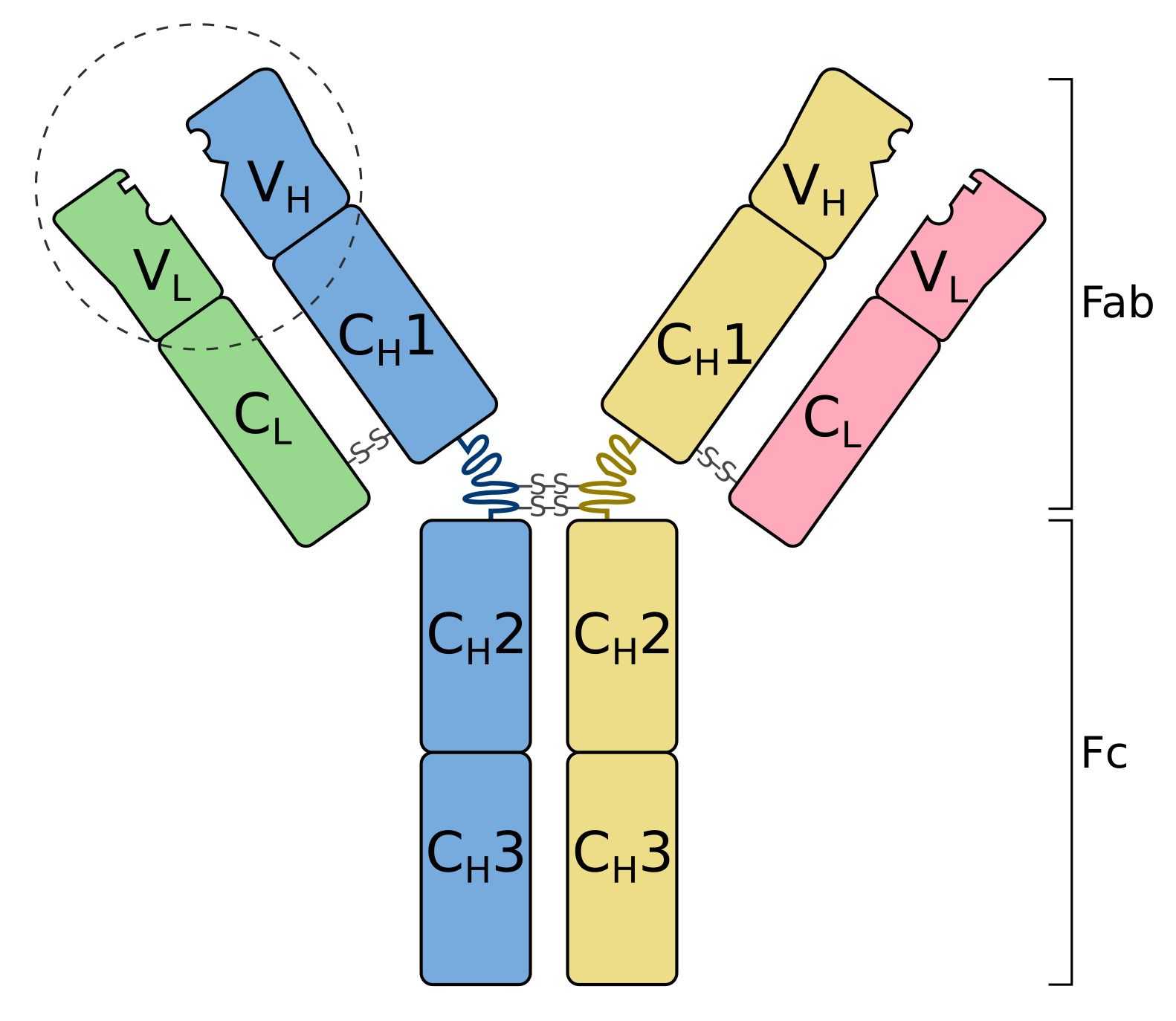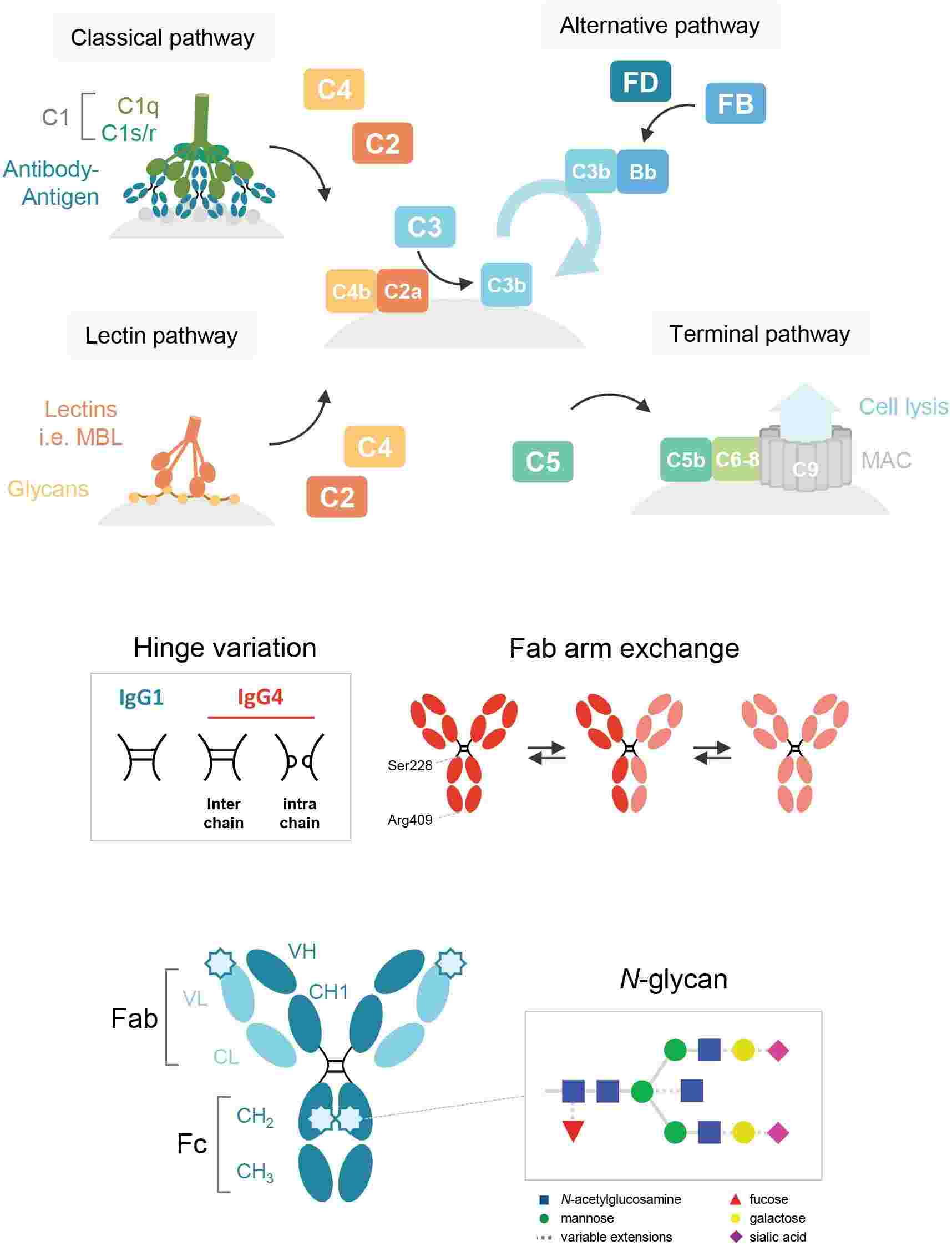Antibodies (Immunoglobulins, Ig) are large Y-shaped glycoproteins produced by B cells of the immune system to identifying and neutralizing foreign pathogens (antigens) such as bacteria and viruses. The complement has been discovered as a principal effector in the antibody-dependent killing of microorganisms. This system takes part in marking of foreign pathogens and presenting them to B cells in a manner that enhances both antibody production and long-term memory. In the activation of the complement system, there are at least 40 receptors, zymogens, and regulators engaging in the enzymatic cascade cleavages, which account for ~5% of the globulin fraction of blood serum.
-
Antibody Introduction

Fig. 1 The structure of secretory immunoglobulin (Ig).1
Humoral immunity mediated by antibodies is a form of specific immunity primarily directed toward extracellular antigens. In general, antibody molecules contain two identical heavy chains covalently linked to two identical light chains. The variable region is responsible for antibody binding and the constant region is in charge of regulating most effector functions. There are five types of antibody molecules serve different functions. IgA is critical for mucosal immunity, IgD is an antigen receptor on naive B cells, IgM is involved in primary antibody responses, IgG is the major immunoglobulin in the circulation and is essential in secondary antibody responses, and IgE modulates immunity to parasites. An individual is able to generate millions of varying antibodies in millions of varying B-cell clones through the process of gene rearrangement and junctional variety.
-
The role of Complement in Induction of Antibody Production
Recently, there has been considerable progress in understanding the mechanisms of cooperation between T and B cells in the induction of humoral antibody formation. The discovery of interaction among lymphocytes and the fixed C3 component of complement has demonstrated that C3 receptors are a characteristic of B-cell populations, raise the chance that C3 may play a role in this process. Germinal centers of lymphoid tissue, in which antibody production might occur, consist of B cells, fixed C3, and compounds capable of fixing C3 component.

Fig. 2 Involvement of the complement system in antibody responses.2, 3
The impacts on antibody responses may result from complement activation rather than interference with the direct involvement of complement in induction. In one in vivo study in mice, suppression by C3-cleaving protein of cobra venom (CoF), and several C3-reactive agents (zymosan, anti-C3 antibodies, aggregated IgG, and type III pneumococcal polysaccharide) of the thymus-dependent antibody responses to ovalbumin, human IgG, and sheep erythrocytes was manifested. Nevertheless, the thymus-independent antibody response to polyvinyl-pyrrolidone wasn’t affected by CoF. These and previously published findings suggest that functional C3 is required for the induction of thymus-dependent antibody production. A model for C3 in lymphocyte cooperation is proposed by virtue of these data analyzed according to existing knowledge.
-
Deficiencies of Complement Factor in Antibody Production
The complement system also takes effect in adaptive immunity in addition to its well-established activities in natural immunity. Deficiencies in complement factors complement factors C2, C3, or C4 and lack of complement receptors 1/2 (CR1/CR2) result in impaired antibody production. The activation of the classical pathway plays a major role, as mice deficient in factor B (an important factor in the alternative pathway) have normal antibody production. Antibodies in complex with their specific antigens are reported to feedback regulate the antibody response, and improved responses are started by IgM, IgG, and IgE. IgM operates via the complement system, whereas IgG and IgE perform independently of complement via Fc receptors.
Here, these isotypes have been investigated whether they can enhance antibody responses in mice lacking CR1/CR2. Sheep red blood cells (SRBC)-specific IgM, treatment with SRBC, doesn’t strengthen antibody responses in the animals. By comparison, 2,4,6-trinitrophenyl-specific IgE and IgG2a, treatment with BSA-2,4,6-trinitrophenyl, induce robust antibody responses in CR1/CR2-deficient mice. These observations indicate that CR1/CR2 is necessary to promote IgM-mediated primary antibody reactions.
In other studies, animals lacking C5 and complement factors C6 would mount normal antibody responses, which together with evident effects of anti-C3 antibodies, illustrate that C3 is the key component. And C4-deficient guinea pigs, although still can immobilize C3 by the alternate pathway, show impaired responses to specific antigens.
Creative Biolabs offers a full range of complement component-related services and products. If you’d like to know more information, please directly contact us and consult our technical supports online.
References
-
From Wikipedia: Tokenzero - Own work, based on File:Immunoglobulin basic unit.svg by Y_tambe, CC BY-SA 4.0, https://commons.wikimedia.org/wiki/File:Antibody_basic_unit.svg.
-
Oskam, Nienke, et al. "Factors affecting IgG4-mediated complement activation." Frontiers in Immunology 14 (2023): 1087532.
-
under Open Access license CC BY 4.0, without modification
Related Product
For Research Use Only.
Related Sections:


